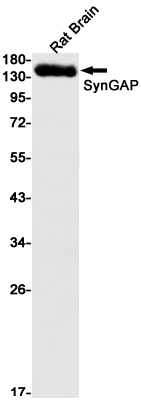
| WB | 咨询技术 | Rat |
| IF | 咨询技术 | Rat |
| IHC | 咨询技术 | Rat |
| ICC | 技术咨询 | Rat |
| FCM | 咨询技术 | Rat |
| Elisa | 咨询技术 | Rat |
| Aliases | MRD5; p135 SynGAP; RASA1; RASA5; SYNGAP1 |
| Entrez GeneID | 8831 |
| WB Predicted band size | Calculated MW: 148 kDa; Observed MW: 148 kDa |
| Host/Isotype | Rabbit IgG |
| Antibody Type | Primary antibody |
| Storage | Store at 4°C short term. Aliquot and store at -20°C long term. Avoid freeze/thaw cycles. |
| Species Reactivity | Rat |
| Immunogen | A synthetic peptide of human SynGAP |
| Formulation | Purified antibody in TBS with 0.05% sodium azide,0.05%BSA and 50% glycerol. |
+ +
以下是关于SynGAP抗体的3篇代表性文献摘要信息,供参考:
---
1. **文献名称**:*SynGAP: A Synaptic RasGAP that Associates with the PSD-95/SAP90 Protein Family*
**作者**:Chen, H.J., Rojas-Soto, M., Oguni, A., Kennedy, M.B.
**摘要**:该研究首次报道了SynGAP蛋白的克隆及抗体制备,通过免疫印迹和免疫组化证实其在突触后致密区(PSD)的富集,并发现其通过调节Ras信号通路影响突触可塑性。
2. **文献名称**:*Regulation of Synaptic Strength by Protein Phosphorylation in SynGAP Knockout Mice*
**作者**:Kim, J.H., Liao, D., Lau, L.F., Huganir, R.L.
**摘要**:利用SynGAP特异性抗体研究基因敲除小鼠模型,发现SynGAP缺失导致突触Ras/ERK信号异常激活,进而影响长时程增强(LTP)和认知功能。
3. **文献名称**:*SynGAP Controls cAMP Signaling in Postsynaptic Neurons*
**作者**:Komiyama, N.H., Watabe, A.M., Grant, S.G.N.
**摘要**:通过免疫沉淀结合抗体验证SynGAP与PSD-95的相互作用,揭示其通过调控cAMP-PKA信号通路参与突触发育和神经元形态可塑性。
---
以上文献均涉及SynGAP抗体的实验应用(如Western blot、免疫组化或功能研究),并探讨其在突触信号传导中的核心机制。如需扩展可补充具体年份或期刊信息。
SynGAP (Synaptic GTPase Activating Protein) is a critical neuronal protein predominantly localized at the postsynaptic density (PSD) of excitatory synapses. It interacts with PSD-95 and regulates Ras/Rap GTPase signaling pathways, which are essential for synaptic plasticity, dendritic spine development, and cognitive functions. SynGAP haploinsufficiency is linked to neurodevelopmental disorders, including intellectual disability, autism spectrum disorders, and epilepsy, underscoring its role in brain function.
SynGAP antibodies are indispensable tools for studying its expression, localization, and interactions in both physiological and pathological contexts. These antibodies are widely used in techniques like Western blotting, immunohistochemistry, and immunoprecipitation to investigate SynGAP isoforms, phosphorylation states, and dynamic changes during synaptic activity. Specific monoclonal antibodies (e.g., targeting distinct epitopes) offer high specificity for isoform differentiation, while polyclonal antibodies may provide broader detection across conserved regions. Validation in SynGAP knockout models is crucial to confirm antibody specificity, as cross-reactivity with unrelated proteins can lead to misinterpretations. Recent studies employing SynGAP antibodies have revealed its temporal-spatial regulation during brain development and its dysregulation in disease models, aiding therapeutic research. However, variability in antibody performance across commercial sources highlights the need for rigorous validation to ensure reproducibility in neuroscience research.
×